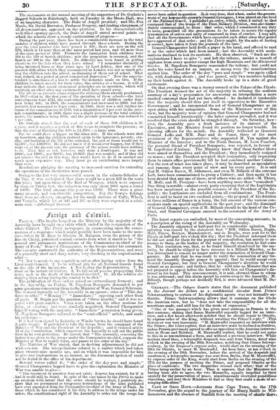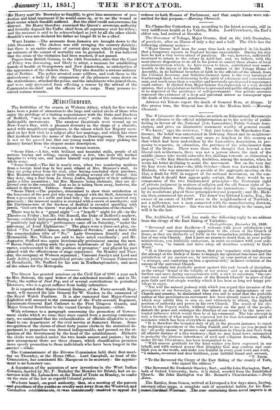forrign uu Coluntal.
FRANCE,--The insults heaped on the Ministry by the majority of the Assembly have brought on a crisis which ended in the resignation of the whole Cabinet. - The Pat,* newspaper, in commenting upon the conse- quences of a resistance which might possibly have been. made to the inea- Hares taken by *. Base to liberate M. Mauguin from the prison of the
• . Rue de Clichy, published textual extracts from what it stated to be "the s; general and -permanent instructions of the Commander-in-chief of the Army of Paris," General Changarnier, to the 'troops under his command.
The extracts contermOd the authority of the Representatives, and were - of a generally-short and sharp nature, very,. shocking to the unprofessional mind—
"1. Not to accede to any requisition unless after having orders from the Lieutenaut-General. 2. To be without pity for all National Guards found an -the side of the insurgents. 4. Not to obey the Representatives. 7. To shoot on the instant all traitors. 8. To fall on all persons propagating false news, such as the death of the General-in-chief. 11. .111 the soldiers ab- staining- from acting during the combat to be shot."
The publication of these orders raised an extraordinary ferment ; and in the Assembly, on Friday, 31. Napoleon Bonaparte demanded to put -some questions concerning them to the Minister of War, General Schramm. The demand instantly set the Assembly in an uproar ; cries of "This day three months !" " Monday ! " "Immediate !" .opposing each other from all parts. M. Dupin put the question of " three months," and it was re- jected with great outcries. Votes were taken on the other motions for delay, or evasion ; and were similarly negatived, General Changarnier -himself voting with the majority. "Immediate" permission being given, 31. Napoleon Bonaparte referred to the " semi-official" article, and made his criticisms— If it had been signed by Racletzky or- Windissligratz, he should have found it quite simple. It pretended to take the troops from the command of the Ministir of War and the President of the Republic ; and it violated. article 32 of the Constitution, which empowers the Assembly to call out the public
• force in its own protection. He moved, -that "The Assembly, censuring the
• instructions given to the troops under the Commander-in-chief, requests the _Minister of War to modify them, and passes to the order of the day." The Minister of War stated, that in desiring adjournment he did not wish evasion. The interpellations related to a matter which had taken -.place twenty-nine months ago, and on whichit was impossible for him to give any explanations in au instant, as the-document spoken of could
• not be found in the office of his department.
',Several voices called fee "the-order of the day pure and simple." '-. General Changarnier begged leave to giro the.explanation the Minister of
• -War was unable to give-
. " The:document in question does not exist; it never has existed, for. if it jJtsdit eould still be found. In spite of the care taken by the Patric o.make enatutn- with intent that the order should be textual, I positively de- eclare that no, permanent-or temporary instructions of the kind -published _ have ever emanated from the Commander-in-chief of the Army of Paris. In
• those which he has considered it his duty to address to the troops under his .orders, 'the-constitutional right of the Assembly to order out the timer has
nerer-beenmalledin question. elfeia very-true, -thatwhene under-th eisentof myshostoutable.00nirsde,GreteraLCarvaienuieeLwae planed.at=1137td 0f. theel'ationa-VOmaid, • L-141iehed ausorder,. which wheal I united, tosethat mommauct tbat -at tha treppa of stlie Tirstalliliaary-Rivisionr.lesealsoiannee- diately communicated, to -them : Ikea orderewhich I considerediteny duty .to issue, suesciibed all the precautions Jo.; be. Ukeleles secure the rogidar transmission ot.ordere and unity el .command,iu ,tizne of monabat. I may add, -that. all the Govenimeuts which havessucceeded.each Other.since thateseriod hero approved of. that erder ; awl .the rakeiesinight, for thasake. of .1usveng .itoorruct,have taken itrfrom.tho journals of the time." General Chaogarnierheldaforth a -paper in. his imude and, offered. to .read it as the onlerewhich. hadebecniesued eibut the Assembly with accla- mations-declined. to test' its oontents. • Ile then observed, ‘• Such are the explanation 1 have teegave ";r and left the tribune, amidst a- -tumnit of sapplause from. every quarter exeept the high Mountain.and, am Ministerial benches. Ma N•apoleenBonaparto reaseended the trlune, but could not -make his voice beard for an instant, so strong were the •manifestations against him. 'The-order of the day -" pure and simple was again called . for, with deafening 'shouts ; and was passed, only two members.h.olding up their-hands against it. -The -Assembly broke up in a, stateeof. great excitement.
On that evening there was a stern-my council at the Palace.ofthe Elys0e. The President deemed the act of theauajority in- -refusing the .uniform courtesy of reelay's preparation, for answering an intermediation a .more
• marked contempt than had yet.been offered : eha declared it intolerable that the majority should thus put itself in opposition-to the Executive -Government e • and.he interpreted the act. of General Changarnier as an open siding with his 'antagonists. - Same of the -Ministorsewere of- this view, but the majority were of opinionthat-General Ghangarnier had not committed- himself irretrievably the latter opinion prevailed, and it was resolved that the crisis should be-struggled through. On Saturday, how- ever, the. Assembly gave a fresh instance of its distrust of the Executive, and 'the. Ministry, found its position no longer tenable. In choosing -officers for the month, the. Assembly .reffieeted as Questors .General , Lefie:and • MM. -Bate- and de • Panat, three of the . most prominent of the Representatives who-supported .M. :Yon against the Minister of the Interior; - and--in--the' Ninth Bureau, .M. Leon Faucher, -the personal friend of President Bonaparte, was- rejected., in favour of M. Lepelletierd'Aulnay. The ',Ministry knew that 'these further blows were aimed at themselves and the-President; 'they immediately resigned en masse s and .the. President accepted their resignation, . only-requesting them to r'etain.effiee provisionally till he had combined another Cabinet. For the rest of what--has taken place, it may be described, as speculation and rumour • from every point of view and by every party. Ites said that M. Oddon Barret, M. Abbatucei, and even 31, Billault of the-extreme Loft, -have been commissioned to group a Cabinet ; and, then again it has beenedenied: that any one.of these, or of others who are Added—M. niers, M. Mold, and M. Persigny—have been anything more-than "consulted." One thing ismotable—almost every party excepting that of the Legitimists has been mentioned as the possible-resource of the President of the 'Re- public s the Legitimists are excluded from all combinations. .-The Presi- dent is said to insist-on two cardinal points,—the proposal of his dotation at three millions.of.fmnes in a lump, the full amount of the various eon- cessiens.made smespecial applications in the past year ; and the dismissal of General Ghaiegarnier, even-if.M. should-he the head ref the Ca- binet, and General Cavaignac ssuceeect_to_theminmand of the Army of Paris.
The latest reports am embodied, by moSt of Ilse concurring accounts, in a description of the rising of the Assembly me Wednesday.
The -Assembly adjourned at half-past five in considerable agitation. The agitation -was caused by the statement that , 11111.- Odilon Barret, Dppin, Mole, Thiers Berryer, Montalemberte and de Broglie,. were sent for to- the Fdysee at. half-past two o'clock this day ; that the President informed them he did not send for them for the purpose of consultations but merely-to an- nounce to then:leas the leaders of thesmajority, the resolution he had-come to. That resolution was. that, as he found- himself abandoned by the-ma- jority, he should be 'obliged to have recourse to a Billault Ministry; as he was determined to remain no dowser under the domination of General Chan- gamier. He said--that he-was imady. to ratify the nomination of any- Ge- neral the Assembly thought proper to. appoint ; that he would accept even General Cavaignace but that to General Changarnier's -dictation' he would submiton no account ; and further, that he ould take no Minister that was not prepared to appear before-the Assembly- with Gen ral Charigarniees dis- missal in -his hand. - This announcement, it is said,. alarmed-those to whom is was addressed; and-this alarm spread by contra-coup to the:Assembly. -M. Billault, though perhaps-not decidedly Red, is more advancedthmild. Du- ' faure."
GERMANY.—The Cologne .Gtiutte states that the. document. published in - the journal des . as a confidential • .eir-oular ,from • Prince Schwarzenberg to certain of his,diplomatic agents - was not- textually au- thentic. Prince .,Schwarzenberg _allows -that .it conteine on the- whole the Austriazaview, but he " does not take-theeresponsibility for all the • assertions, made, arid-still less for the mode of expression." "One- of the -passages which has given most umbrage- in'Pressia is the • first-sentence •atating-Ithat•Baron Mantettffel urgently begged for an 'inter- view, and a -law. hours afterwards notified 'that -he should repair to Olasiitz, by express order of the King, 'without awaiting the Prince's-reply." ,This statement was yoryinaeourute. '".M.- Manteuffel requested an interviewevith the -Prince ; the latter replied, that as-interview mast be-decline:1as fruitless, unlefIsTrussia previeuslragreed to offer no opposition' to the Austrian interven- tion in Hesse and Holstein. ,14.- Manteuffel -replied, that he could not agree to -this in .scr unconditional' alarm, and without e-previous interview. 'While , matters stood thus, a telegraphic -despatch was-sent•froni Vienna, dated nine ' o'clock in the evening of the--26th November, notifying that -Prince Schivar- zenberg, by the Emperor's express order, would start on the evening Of the 28th for Olmiitz, to meet ,M.- Manteuffel. An hour fater, at ten o'clodk in the evening of the-26th November, sbefore-the arrival- of the'destairjtst -mentioned, a telegraphic' message was sent from Berlin; that M.' Manteuffel, by express-order of the King,-'would start-from' 'Berlin on-the eeening-Of the , 27th for the-' purpose -of meeting the -Prince, and proposed Glentitzeas the place of conference. 'The two despatches crossed each other,' that- of-'the Prinee•being earlier -by an hour. :Thus it • appears,' that- theMinisters•not 'having been, able-to' agree, the -two 'Monarchs, equally impelled by their 'anxiety for thepreservet-Mn of peace, simultaneously overrided'punotilieus objections,- anciaent their Ministers to find as therliest•muld a mode' of ar- ranging difficaltier."
j CAFE OF GOOD Hoena=aficcounts .frem Cape Town, to the :17th - November, give ;the aequel to the journay of Sir Haw 'Sniith, to W41- liametown and the ibsenee of Bandilli from -the meeting Of 44* there. "IsSiellarry rierceMi. ':Brostmlee- tcrEandilli;' give; him: assurances • of pro-
Steotion _Malin& treatment if he waild.come or to..sec;:the s wound or • achurt "under avhiolr7Sandilli.suffered. But the ohief .could notoveroome his -41istrust. Sir Harry-therefore .:exereised the Queen's -sovereignatitlacuity Mad formally`deposed the Caffre chief from all supremacy over his tribes ; and the measure is said to be acknowledged as just .byill. the other chiefs. cSandilli's'ownatur:declardd his father mo longeefit to be a Chief.
WEST; IND1ES.,—r.The: ..aeciounts from Jamaica are brought down to the iI5th: December. The cholera -was- still - ravaging--the -country districts ; --but there is an entire absence of correct- data upon which- anything like an estimate--of the extent of mortalityean be grounded. It was .believed that the crisis-of thesvisitation had been pealed, if.not passed. PapersTromBritith Guiana, to the 14th December, istate thatthe Court of Policy was 'discussing, and -likely to adopt, a measure for establishing "hoards of health at Georgetown- and New Amsterdam, imantiapation of :the appearance of the cholera there. They-also describe a serious-military -riot at Beilice. The police arrested some. soldiers, and, took them to the ..stationhouso.; .abody of the.companions of the prisoners- came _down on ithe Italia:louse, attacked the police,- and the inhabitants who joined them, and were only prevented from effecting a -rescue by the- arrival- of the LCommatidersin-chiof and the officers of the corps. :Many, persons re- seeived serious wounds.



























 Previous page
Previous page